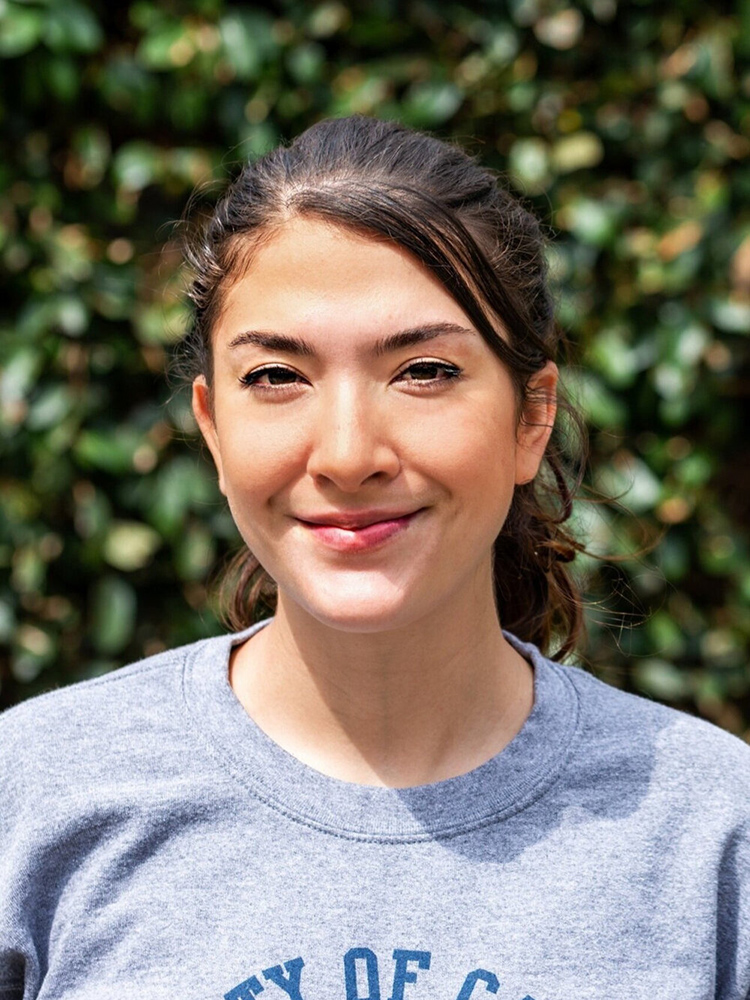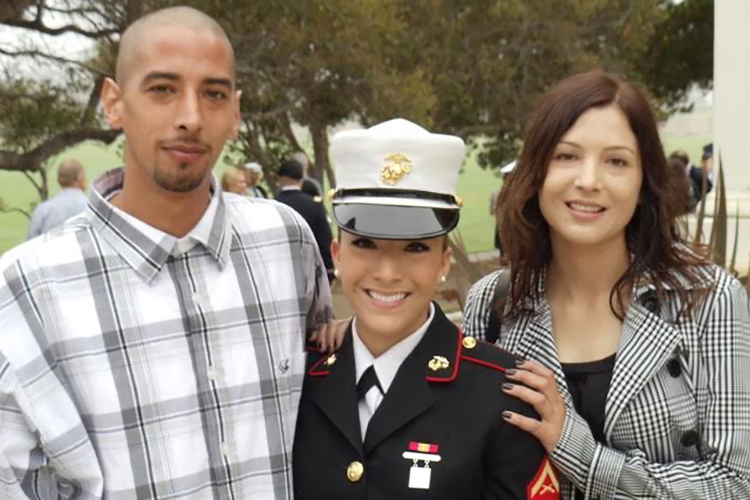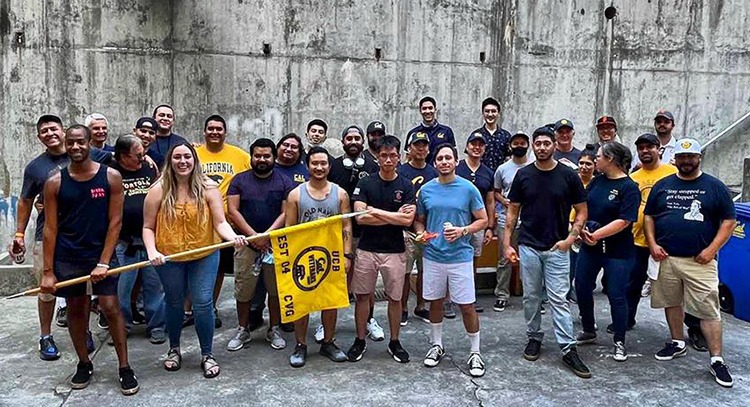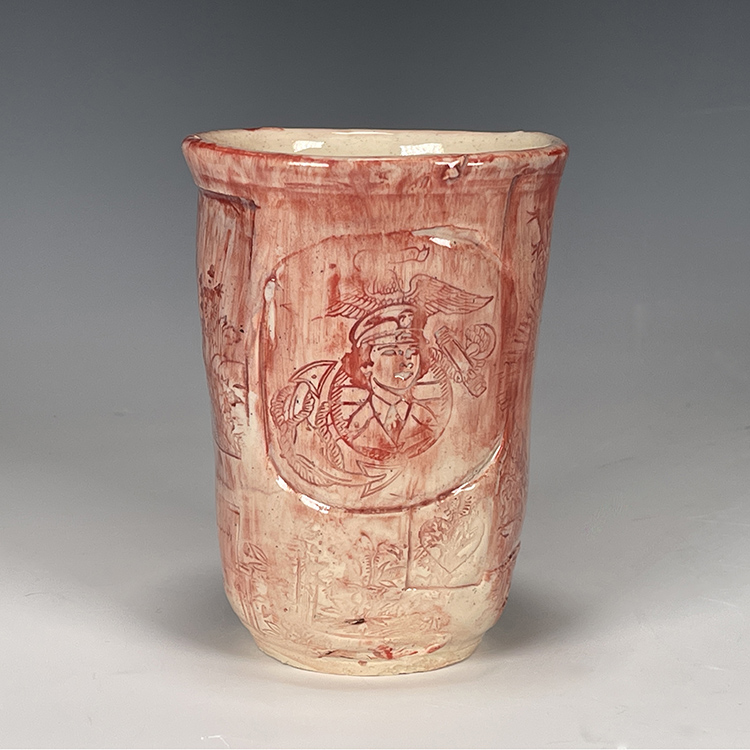I’m a Berkeleyan: Student veteran Gloria Kunder has found a community that heals
Cal Veterans Services Center student intern says, “We come together, we respect one another, and we maintain a community of acceptance. All are welcomed.”
November 10, 2021

Student veteran Gloria Kunder says she has found a place where she belongs through the Cal Veterans Services Center. “We come together, we respect one another, and we maintain a community of acceptance. All are welcomed.” (Photo courtesy of Ehren Tool)
This I’m A Berkeleyan feature was written as a first-person narrative from an interview with Gloria Kunder. Have someone you think we should write about? Contact [email protected].
I often fear being judged for having a perspective that doesn’t conveniently fit the stereotypes of how a military veteran should think or feel.
There are assumptions often made about the reasons people join the military, and those connotations can be stressful to navigate. As a Marine Corps vet, I’ve never been someone who is pro-war, but I also have seen the positive things military service has done for people, including myself.
In some spaces, though, I don’t want to mention I’m a veteran because I’m scared of people judging me and thinking I’m a war monger or something. And in other spaces, I’m afraid to speak up and tell other veterans what I really feel about the military’s predatory practices.

Gloria Kunder serves as a project coordinator intern for UC Berkeley’s Cal Veterans Service Center. (Photo courtesy of Luis Hernandez)
These are insecurities that I think other veterans have, too, which is unfortunate because our experiences are so nuanced and diverse that we shouldn’t be placed into an ideological box.
Sometimes it’s hard to talk about potential trauma we have encountered through our service. But it is essential for veterans to take those imperfect moments in our life, and our service, and find spaces to heal and share our stories — for ourselves and for others to understand us.
I was born and raised in San Francisco by a single teen mother. She was 16 when she had me. We lived on welfare in a one-bedroom apartment in the Western Addition.
Growing up, I remember being hungry often. Whenever we did have food, I would sit in our kitchen for hours just eating as much as I could: It felt good to feel full, if only for a day.
My childhood was volatile. The good times were great, but the bad were suffocating. The strain of poverty, as well as my mother’s own trauma from her childhood, her first relationship, and later the murder of her sister and niece, was at times too much for her to bare.
Home was not the perfect environment to flourish.
I could envision myself falling into the same cycle of teen pregnancy and poverty that other women in my family have gone through. Although my family did not have a history of education, my mother always told me that if I ever wanted to make it out of the way we were living, I needed to go to college.
But that was met with, “and I have no way to pay for you to do that.”
So, after high school I moved out and began working odd jobs, from retail to waitressing, while going to San Francisco City College. There were times when I was living out of my car and just trying to make money to survive. And for a few years, the dream of going to a university began to fade away.
“You need to fix this,” I would tell myself. “You need to fix your life.”
Joining the Marine Corps was a very fast decision for me. In February 2010, I submitted an online inquiry, and three days later I signed a five-year contract. I wanted the financial security that I never had as a child. And I wanted a pathway to go back to school. The Marines would give me that.
It felt like the only thing that could save me: And it did.

Gloria Kunder, center, with her uncle, Joe, and mother, Monica, after completing Marine bootcamp in South Carolina. (Photo courtesy of Gloria Kunder)
I became a linguist specializing in translating and transcribing data, and my service eventually gave me financial benefits that cover college tuition costs and certain living allowances.
But joining out of desperation was a big culture shock for me.
I remember seeing someone flying the confederate flag at boot camp in South Carolina, and I freaked out. I am multi-racial — with Mexican, Puerto Rican and Filipino family ancestry — and I thought the Ku Klux Klan was coming to attack us or something.
I told my drill instructor, who was Black, but she just told me to “keep marching.”
Marine training is a very controlled environment. You’re going to learn exactly what they teach you. But I didn’t join out of a sense of patriotism. Being in that headspace allowed me to maintain my own personal beliefs without being easily influenced: This often left me feeling like I didn’t belong.
Whenever there was any anti-Muslim sentiment from other service members, or even when folks disparaged the value of recycling or doubted the very real effects of global warming, I would speak up. But my opinions would be disqualified simply because I was from “liberal” San Francisco.
I also encountered hate for simply being a woman, and not just any woman, but a woman who wore makeup: Not only did my gender disqualify any opinions I had, but the makeup pushed me into a realm of stupidity where no valuable thoughts could grow from.
People were always trying to police you for doing those things, and I found myself being more passive and less outspoken. I developed new anxieties and stressors from trying to fit the mold of an acceptable Marine. I still have difficulty speaking up for myself or disagreeing with others. But I’m in therapy now, and I’m working on it.

Kunder pins her husband after he was promoted to Sergeant. “He accepted me for who I am and has been such a supportive husband since then,” she said. (Photo courtesy of Gloria Kunder)
While I did have these experiences throughout my military service, and met people that I’d be happy never to see again, there were also many other times that my feelings and opinions were respected by truly wonderful people — who often had different perspectives from me — one being my husband, Alex.
We met in the first year of my service, and eight months later, we got married spontaneously on a sidewalk in North Carolina. He accepted me for who I am and has been such a supportive husband since then. We’ve been married for 10 years now.
Four years into my service, we had our first child. Around that time, I left the Corps to take care of my mother, who got into a life-threatening car accident. She lived with us in our home in Solano County for a year to rehabilitate.
During that time, our relationship grew stronger. I would have a second child, a daughter, and my mother had a newfound appreciation for life, and was calmer and grateful.
Once I left the Corps, I was pretty much done with being a part of anything having to do with my military service. I attended Solano Community College and visited a few functions hosted by various veterans’ groups, but unlike the Marine Corps, the camaraderie of having served alongside one another wasn’t there, and so the respect wasn’t either.

Kunder said her children have been a light in her life. Here, she is spending time with her daughter at a local park. (Photo courtesy of Gloria Kunder)
So, events I tried to be a part of tended to be the most uncomfortable experience for me — until I transferred to Berkeley in 2018 and found the Cal Veterans Service Center.
Luis Hernandez, the center’s program coordinator, is the reason I came to Berkeley. He invited my family to campus, got us a place to stay, and made us feel so welcomed. I also met other veterans on campus who were also parents, or children of immigrants, and didn’t come from the stereotypical military family background.
“Oh my God, these are my people!” I thought.
Berkeley’s veteran community also felt very accepting to student parents and their daily situations. Going to campus events, Luis is always like, “Bring your kids. You don’t have to apologize for being a parent here.”
And when it comes to cases of disrespect, hate, racism or misogyny, folks displaying those actions are expelled from the center. We come together, we respect one another, and we maintain a community of acceptance. All are welcomed.
Being a part of this community at Berkeley has helped me to heal the trauma and anxiety that I still have from my childhood and military service.

Kunder said the Cal Veteran Service Center community has helped her to adjust to life at Berkeley and guided her in her goal to graduate this spring. (Photo courtesy of Luis Hernandez)
As part of Berkeley’s Veterans Day celebration and art gallery — on Saturday (Nov. 13) at 12 p.m. in the Wurster Hall Platform Artspace — I will be displaying a cup I made as part of the art therapy sessions that fellow Marine veteran Ehren Tool holds on campus.
Ehren is Berkeley’s ceramics studio manager at the Department of Art Practice, and a few years ago, after a student veteran committed suicide, Ehren started inviting the veteran community to tailgate at Wurster Hall’s art practice building and create veteran art cups together.
It’s a space to express what we are feeling. We can share our experiences through our art and make it into something that is meaningful to us.
It’s very freeing and cathartic.

Kunder will share her military cup at Berkeley’s Veterans Day celebration and art gallery this Saturday. (Photo courtesy of Ehren Tool)
My cup defines my experience in the military. I wasn’t just a Marine, but a woman Marine. I enjoyed paying homage to that. I chose an image of the first female Marine in media (from recruiting campaigns), and I incorporated the image of a vagina blossoming around flowers.
To me that symbolizes life, birth, regrowth, death and the full spectrum of existence.
I’m typically not one for inspirational messages, but on my cup, I thought it was important to note that, in everything I have faced, I persisted. Not just in service, but as a veteran, because life is so much more than that one experience — so we keep going, growing and learning.
I love plants and working with soil. I find peace and satisfaction in it. So, I want to put a plant in my cup when I take it home to see something grow in it.
In many ways, my cup also symbolizes the very complicated feelings I have about my relationship to being a veteran: It’s flawed, but nonetheless, I’m grateful for it because it led me to Berkeley, and that’s exactly where I want to be.